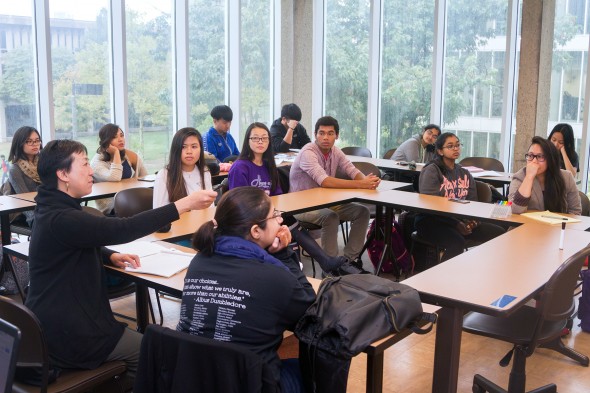Mentor program helps Asian American students navigate cultural issues

The Asian American Mentoring Program provides students with resources and role models within the UIC community. (Photo: Vibhu S. Rangavasan)
Growing up in central Florida, UIC senior Elaine Rivera could count on one hand the number of other Asian American students in her high school.
When Rivera, a first-generation Filipina American, arrived at UIC, she discovered the Asian American Resource and Cultural Center and realized that other students were also learning to understand what it meant to be Asian American.
At the center, the neurosciences major became involved with the Asian American Mentor Program (AAMP) and worked with an older student, who served as her mentor. Since then, she has served as a volunteer mentor to other students.
This year, Rivera is taking part in a new initiative that rewards mentors and mentored students with college credit within Global Asian Studies, a new program this fall that merges Asian American Studies and Asian Studies.
“Coming here I learned while being a mentored student and a mentor what it meant to be Filipino American and the types of stereotypes that come along in daily experiences and how to deal with it,” Rivera said. “AAMP does a really good job of giving you resources to navigate through issues…especially with school going on.”
The center received a five-year, $1.5 million grant from the U.S. Department of Education’s Asian American and Native American Pacific Islander-Serving Institution program (AANAPISI). It is the latest AANAPISI grant that UIC has received for a total of $5.4 million overall through 2020.
The initiative is designed to offer programs to support the recruitment, retention and graduation of Asian American, Pacific Islander and English-language learners but is also open to other students.
Anthoney Alonzo, 21, who is from Chicago, said his mentor helped him make the transition to college easier. When the kinesiology major became a mentor himself, he was able to share what he learned with other students.
“My mentor gave me a safe place to go when things went wrong and I want to impart that to my mentored students,” said Alonzo, a senior.
The second-generation Filipino American student said he believes earning credit for the class will help increase participation and reward students who may be drawn to the program but can’t attend due to time constraints. He said that the credit also rewards students for their everyday experiences.
“We all brought in our own experiences and that sort of learning experience is something I won’t have on my record as having taken academically, when I really feel it is this large learning experience,” he said.
According to Jeffrey Alton, associate director of the Asian American Resource and Cultural Center and leader of the mentor program, the program currently has 34 mentors and 38 mentored students. The program began as a way to provide new students with role models in the UIC community, he said.
“The students coming in felt lost and felt unsure and didn’t have anyone to connect with,” Alton said.
The grant helps to fund overnight mentor training and internship components for mentors. Previous AANAPISI grants funded outings for students on campus and in the city to foster a family atmosphere. Alton said students sometimes even refer to their mentors as “mom” or “dad.”
While many of the topics that students and mentors discuss in their weekly sessions are not just of concern to Asian American students, Alton said they have particular resonance in the community.
They work with counselors to help develop strategies to help students with issues like how to handle pressure from parents who may be immigrants, or recent immigrants and who may be overly demanding of their children.
“A lot of this leads to this notion of everything needing to be perfect because, ‘I’m trying to get into medical school, I’m trying to get into law school and I need straight A’s and if I don’t get straight A’s my world is essentially ending,”’ he said.
What has also been popular for students is the program’s work with UIC’s Wellness Center. The center provides discussions about safe sex practices and sexual identity issues.
“We know from experience that a lot of our students don’t get that talk at home from their parents, their parents being immigrant parents or, culturally, sex being taboo in general,” Alton said.
Mentored students write reflection papers that mentors comment on, said Karen Su, a founding director of the center and clinical assistant professor in the Asian American Studies Program who oversees the Global Asian Studies class. Mentors take an active role in shaping the curriculum and teaching. The grant also funds graduate assistant liaisons between the mentor program and the Writing Center and Math Learning Center, Su said.
“The program builds a strong sense of community for students on a very large campus,” she said.
Jessica Jung, a freshman in business management from Chicago, said the extra help in math will help her. Jung, a Chinese American, said that the most rewarding part was learning that she doesn’t have to ascribe to stereotypes.
“It helps us be proud of who we are as Asian Americans and that we should not have to be put down by other people because we are Asian and that stereotypes are not a good thing,” said Jung. “It was a way to make friends and I have made so many close friends already and it’s only the beginning of the semester.”
Alton said he has heard from past graduates that graduate programs and employers appreciate students’ work as mentors.
“The best part for me, honestly, is watching these students grow and succeed…they find a calling,” Alton said.
Categories
Topics
Asian American, Asian American Mentor Program, Asian American Resource and Cultural Center
